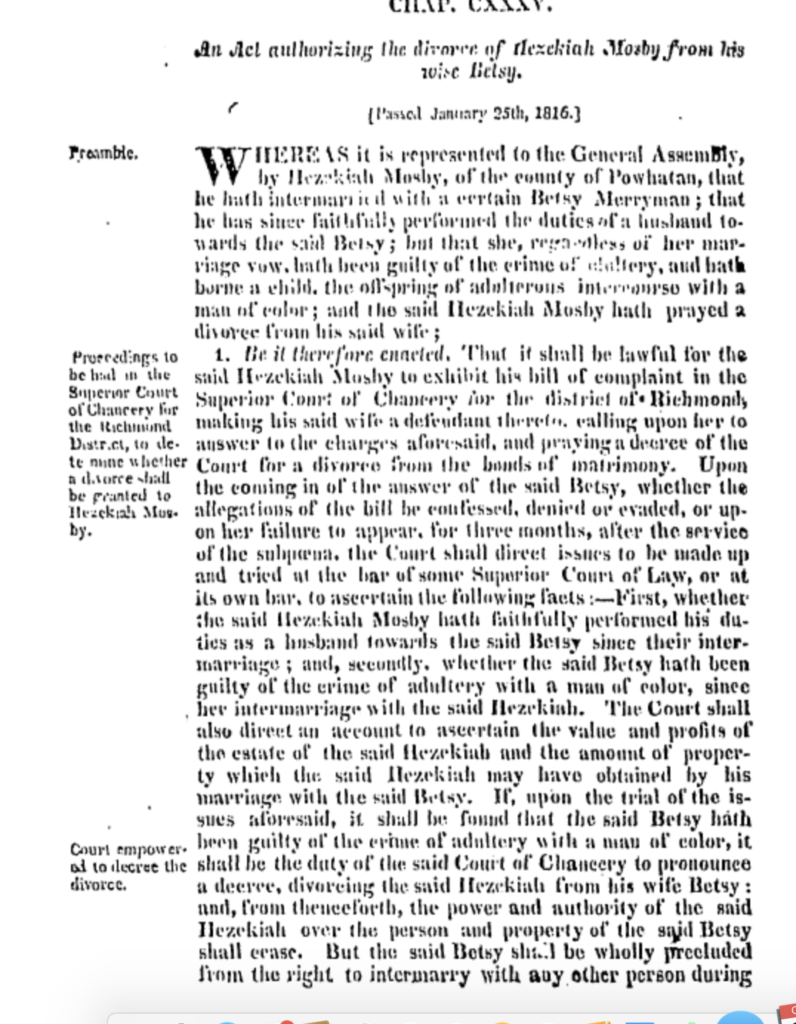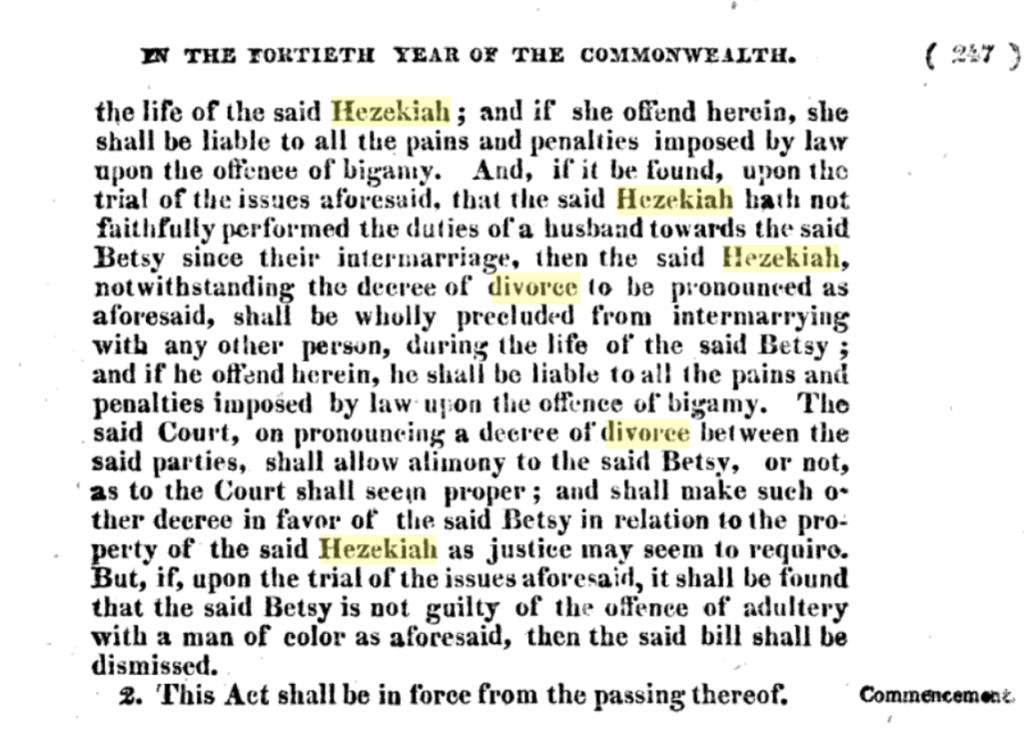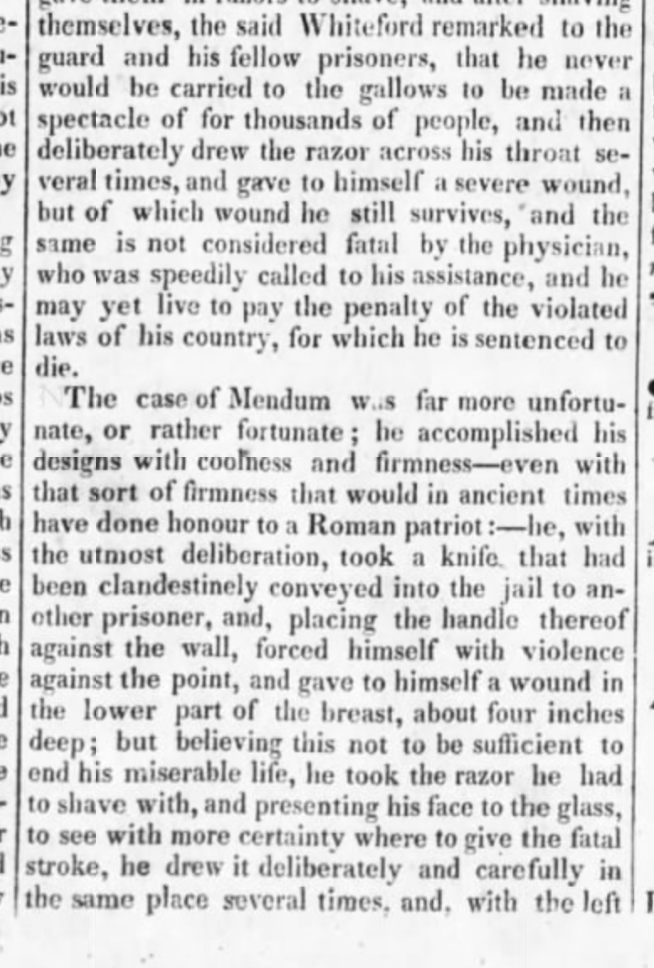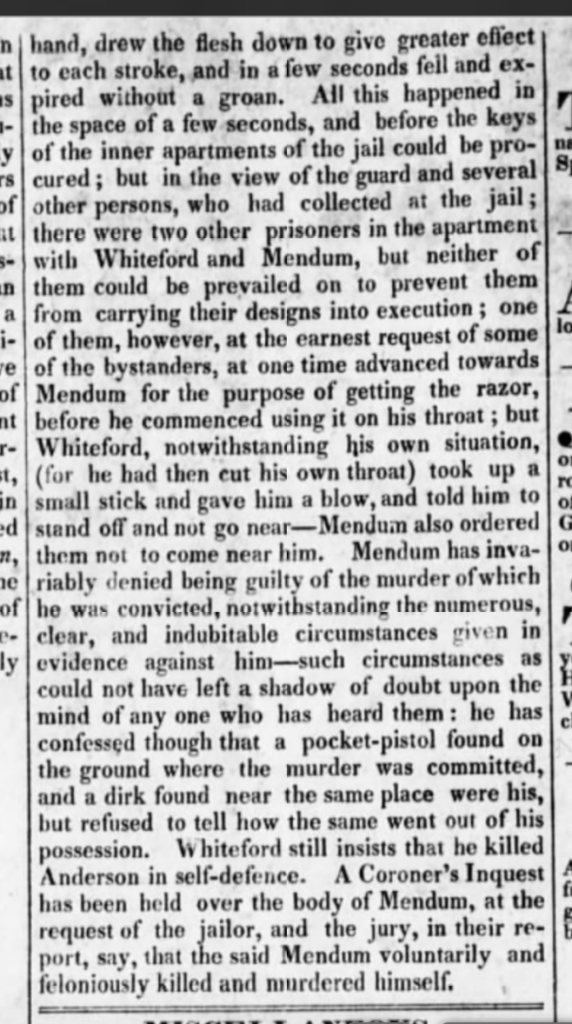hezekiah Mosby, Hero
HEZEKIAH MOSBY (1757-1849)
REVOLUTIONARY WAR
Pension Application of Hezekiah Mosby S13959 Transcribed and annotated by C. Leon Harris
State of Virginia and County of Powhatan, to wit, On this 18th day of October in the year 1832 personally appeared in open Court beforeThomas Miller, Sam’l. Drake, Robert T. Dabney & I B Davis. The Court of Powhatan County aforesaid now sitting Hezekiah Mosby a resident of said County aged seventy two, who being first duly sworn according to law, doth on his oath make the following declaration in order to obtain the benefit of the Act of Congress passed June 7th 1832.
That he was born in the County of Powhatan 12th Jany 1760 formerly County [sic] That some time in the year 1781 as well as he now recollects the Militia commanded by Capt. Robert Hughes was called on & march from this County, formerly a part of the County of Cumberland, that he march with them thro the County of Prince Edward, and crossed the Roanoke at Boyd Ferry [sic: probably Taylor’s Ferry on the Roanoke River and Boyd’s Ferry on Dan River]. from thence to HillsBorough [NC] to Guilford Court House, where he remained a short time.
(That while at Guilford Court House he was attached to the Company of Capt. Ro. Hughes. that the Commandant of the company in which he was when at Guilford Court House was commanded by Gen. [Robert] Lawson, and Col St. George Tucker, that he was in the battle at Guilford Court in March [15th] 1781 in the Company commanded by Capt. Robert Hughes. that some few days after the battle he left Guilford Court House, and retreated to some Iron works the name not recollected [Troublesome Iron Works] about ten miles distant, & after a few days he marched under the command of the before mentioned officers from said Iron works to Ramseys Mills in North Carolina [in Chatham County], and from thence by the way of Hillsborough on his return home to the County of Powhatan, and was discharged after a service of three months.
That some very short time after he returned home he was again called out in the Militia and marched from the said County of Powhatan under the command of Capt Wm Poore [William Poor] thro the County of Chesterfield, and Town of Petersburg and from thence to Cabbin Point [sic: Cabin Point in Surry County] where he remained about six weeks, and marched from thence to Smithfield and from Smithfield to Cabbin Point & backwards and forwards. thro eastern Virginia as commanded and was discharged at Cabbin Point by — Pendleton & — Booker, the grade of the officers not now recollected after having served three months. that he returned home to the County of Powhatan.
That after remaining at home some short time he was a third time called into service under the command of Capt Hughes Woodson, and marched from the said County of Powhatan thro Petersburg and crossed James River at James Town, and from thence he marched to old Williamsburg from thence to York Town and was there stationed under the command of Col. H. Skipwith in the same company of Capt Hughes Woodson where he remained untill after the surrender of Lord Cornwallace [sic: Cornwallis] and was there retained in service, under the command of Capt. Hughes Woodson to guard some prisoners, and marched with them out to old Williamsburg and was there discharged after having served in all Nine months.
That at this late period he cannot undertake to state all the different officers, by whom he was commanded, nor can he recollect all the Counties thro which he marched – his mind like many old men at his advanced age being imperfect — he hereby relinquishes every claim whatever to a pension or annuity except the present and declares that his name is not on the pension list of the agency of any state. Sworn to and subscribed the day & year aforesaid Hezekiah (his X mark) Mosby
NOTE: On 27 Apr 1838 Hezekiah Mosby applied from Erie County NY to have his pension transferred to that state, where he had moved for the following reason: “He was the owner of ten Slaves, and wished to free them, and see them provided for; and the difficulties in the way of this purpose in the State of Virginia, and uncertainties attending a provision therefor, by will, induced him to bring the said ten slaves with him to the State of New York, as the surest and best method of liberating and providing for them.”
He claimed a total service of 15 months, and was granted a pension of $50 per year.
MARRIAGE AND DIVORCE
Since Hezekiah was the oldest son of the oldest son, he inherited the farm and enslaved people. We don’t know if his mother, Martha Walton (1738-1794) remarried or if she managed the farm until he came of age. He married Elizabeth Merryman (1789-?) on 24 Dec. 1807. She was the youngest daughter of Jesse Merryman. He was 47 years old and she was 18. Wedded bliss didn’t last long and in 1815, he petitioned Powhatan County for a divorce.
PETITION FOR DIVORCE
Divorces were rare in Virginia, but to this day, adultery is illegal there.
To the Honourable The Speakers and Members of both Houses of the General Assembly of Virginia.
Your Petitioner Hezekiah Mosby of the County of Powhatan begs leave humbly to represent that in the year 1807 he intermarried with Betsy Merriman of Cumberland; expecting to enjoy that happiness which the married state affords to those who are actuated by proper motives when entering into it, and pursue a correct moral conduct afterwards – That your petitioner has endeavored as far as his judgement directed, to perform his part of the solemn contract in which, before the eyes of God & Man he voluntarily engaged- But with deep felt sorrow he is constrained to declare that such has been the demeanor of that person to whom he once gave his hand and heart – On the contrary your petitioner has had cause often to suspect that she was not only, not faithful to the marriage bed, but moreover, that she bestowed her favours on men of a different colour from herself – so thoroughly impressed was he with this belief, that in the … last when his wife was about to be delivered of a child he sent for several highly respectable ladies of the neighbourhood that they might see & judge when the child was brought into the world, before any accident could happen to it – These ladies did come, & have given their affidavits to the fact of the child’s being one of color and to which affidavits I beg leave to refer your honorable body – Indeed the circumstance is notorious in the neighbourhood, & has been substantially admitted by my wife as will appear by the affidavit of Mr. Thomas Miller, also forwarded herewith – Your petitioner therefore humbly prays that he may be divorced from his wife Betsy aforesaid and (as far as any earthly Tribunal can affect it) restored to that condition which occupied before marriage – Your petitioner cannot presume it is necessary to urge to your honorable body any additional reasons in order to induce you to comply with his request – He only solicits each member to place himself for a moment in his situation, & then call to mind the Divine precept “Do unto others as they should do unto you.”
Powhatan November 27, 1815 Hezekiah Mosby (X) His Mark
Source: Petition of Hezekiah Mosby to the Virginia General Assembly, 6 December 1815, Legislative Petitions, Powhatan County, VSA, Bill drawn, Granted Par #11681530
Hezekiah’s petition for divorce required an act of the Virginia legislature. On 23 Jan. 1816, the Virginia State Assembly passed an act allowing Hezekiah to petition for divorce because “Betsy” had been unfaithful to him and given birth to a mulatto child. It required that the court also determine that he faithfully performed his duties as a husband.
This divorce and Act are referenced many times in books about the relations between races in America.
ELBERT MOSBY’S MURDER
In 1811 Hezekiah’s second cousin Elbert Mosby married his (Elbert’s) first cousin Mary Mosby. That marriage didn’t go well and in 1828 Elbert was murdered by Mary’s lover – Robert Meldrum and one of Elbert’s slaves. The slave was executed quickly, and Meldrum committed suicide while in jail awaiting execution. The trial and proceedings made news in many papers of the time. This event may have been part of what motivated Hezekiah’s actions.
Screen shots of the newspaper article on the murder are to the right.
FREEING HIS SLAVES
Hezekiah sold his plantation and freed his slaves. Then he moved with some of them to Tonawanda, New York. The article that follows gives the story:
From the Buffalo Com. Adv. Feb 2. 1839
BAD REVERSE OF FORTUNE
We have rarely heard of a case involving more loss of property and its attendant comforts, appealing more feeing to the sympathies of our nature, than the following – the particulars of which have been recently communicated to us by a friend conversant wit the circumstances, which are thus stated:
An aged gentleman named Hezekiah Mosby, who owned a large plantation with slaves &c. near Richmond, VA, some three years ago, became anxious to emancipate his slaves, and expended much money in educating and fitting them for their contemplated freedom. Sometime in 1836, he sold his plantation, and was offered some $20,000 for his negroes – but he preferred giving them their liberty. He furnished them with money to bear their expenses to this state, and personally accompanied a part of them, for the purpose of seeing them well and comfortably established where they could be earning a support. He succeeded in procuring situations on farms for all the males but one – providing them with provisions, implements of husbandry, and means necessary to cultivate their farms. He likewise devoted much time in visiting and advising them in their pursuits. They had been devoted to him, and he was much attached to them.
The remaining male, named Charles, with a family consisting of his mother, a sister, and four children, were brought by Mr. Mosby into this neighborhood, and finally settled upon a farm on Grand Island, leased of a free colored man residing in this city, who had formerly lived on an adjoining plantation in Virginia. Mr. Mosby continued remaining with them a short time, as the man Charles was not very capable of conducting affairs, and he wished to aid him by advice &c.
In the fall of 1837, Mr. Mosby and “Charles” had occasion to cross over to this side of the river, to obtain provisions, leaving none at home but the children, the two females being also absent at the time. “Charles” proceeded to this city, while Mr. Mosby, in consequence of a high wind which rendered crossing the river somewhat dangerous, remained all night on this side, at the house of a black man named Ephram Knight, who did not come home till past 12 o’clock. During that night, some person went to the house upon the island occupied by “Charles” and stole Mr. Mosby’s trunk containing $2,000 in dollar pieces, which was all that then remained of his former wealth.
A person living on this side of the river, opposite, was taken up at the time, on suspicion of the robbery, but discharged, there being no evidence of guilt found against him.
Thus stripped in a moment, of the means he had reserved to carry him comfortably through the few remaining days of his earthly pilgrimage, this philanthropic but unfortunate man, was thrown in his feeble old age, upon the hard necessity of obtaining a support by the labors of is hands – for which his previous habits of life and the infirmities of age, but illy fitted him, and it was difficult even to obtain such employment as his strength would enable him to perform. To add to the burden, the only female of the family able to assist much to their household was taken sick and died, leaving her aged mother and the helpless children, dependent on the precarious support which might be gleaned by the labors o the old gentleman and his former slave Charles.
As if their deplorable condition was not already sufficient pitiable, the colored man in the city from whom the farm on which they lived was leased, come to the house while all the family except the children were absent at work, on this side of the island, eight miles distant from home, and on the heartless pretext that “the house was his,” turned the children out of doors, and fastened up the entrance! – leaving them exposed, in the bitter and inclement month of November 1836, without a shelter for their heads! They , however, remained about the house, and put up two boards against the building, which served as a partial protection from the weather, while some refuse fines gathered from the garden, thrown upon the frozen earth, was all they had to sleep upon. In this situation, these poor children actually remained more than an week, with nothing to eat except a few beans and vegetables, which had been left on the ground in the garden, and which they ate uncooked!
On the return of the adult portion of the family, they could only procure a log hut, nearly roofless, and otherwise uncomfortable, upon the island. In that condition, without a bed to lie upon, have this old gentleman and his former slaves since remained, and he has been himself compelled to make splint brooms to obtain the food necessary to avoid absolute starvation.!
Suspicion having lately fallen upon Knight, the colored man at whose house Mr. Mosby staid on the night of the robbery, he was last week arrested, and after a protracted examination of five days before T. W. Woodson, Esq. magistrate at Tonawanda, was committed to the jail in this city, charged with the crime. The facts against him appear to be – that he has within some twelve months past, paid out nearly $300 to various persons, in dollar pieces, for the purchase of stock, &c. Some sixty of these pieces paid to one man, had clay adhering to their surfaces, as if they had been buried and then dug up. From these and other circumstances, enough was established to authorize his commitment.
It is surmised that he has purchased a farm in Chatauque county, with a part of the money stolen; and if that be the case, it is hoped that it may be communicated by any one who may be aware of the fact, so that some portion at least of the money may be restored to the rightful owner.
The above detail is from the minutes taken of the old gentleman’s testimony, on the examination. By a singular coincidence, a gentleman from Virginia on his way to the Falls, stopped at the tavern in which the examination was going on, and recognized Mr. Mosby even in his forlorn condition and tattered habiliments, as one of his old neighbors in Virginia, corroborating fully the statement of Mr. M as to his former wealth and respectability. A subscription was at once started, and enough raised to purchase a suit of clothes for the truly unfortunate sufferer.
Mr. Mosby, whose “own true tale” we have briefly sketched above, was a soldier in our glorious Revolution and fought at Guliford Court House, and at Yorktown under Washington. He once had a wife and children, but death has swept them away, and left him alone, in the dreariness of a destitute old age, with only the poor pittance of pension of $50 to minister to his wants. He is now 82 years old, but very intelligent, and retains his mental faculties in full vigor.
God grant that the sharp misfortunes which have so strangely visited him, may yet be alleviated, and that the munificent philanthropy which has apparently left him to the rough charities of the world may not be without its solace and its reward, even in this changeful and uncertain life.”
In the 1840 census Hezekiah is found in Tonawanda, Erie, New York, as 86 years old and being in a household with Charles Mosby, a free colored male, and 9 other free colored people,
Hezekiah died in 1849 in New York.
The 1850 census shows Charles 38, Cornelius 28, Jordan 20 and Martin 22 as Blacks in Tonawanda. That census also shows several Black and mulatto Mosby families in Powhatan County, Virginia.
Appendix
The appendix includes original documents covering:
Hezekiah Mosby petition for a Revolutionary War pension, describing his service.
Various documents covering his petition for divorce and the state law.
His cousin Elbert Mosby’s murder.
The article from Buffalo New York about his “Bad Reversal of Fortune”




